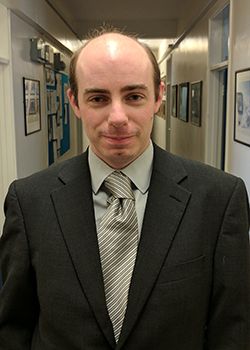
Dr Powell is a Teaching Fellow at the University of Portsmouth, based at RAF College Cranwell. He undertook a PhD at the University of Birmingham, supervised by Air Commodore (ret’d) Dr Peter Gray. His thesis focused on the development of tactical airpower in Britain during the Second World War through the study of the RAF’s Army Co-operation Command. He also holds an MA in Intelligence and Security Studies and a BA (Hons) degree, both from the University of Salford. His first book, entitled The Development of British Tactical Air Power, 1940-1943: A History of Army Co-operation Command was published in 2016 by Palgrave Macmillan.
What are you currently working on?
My long-term project is researching the relationship between the Air Ministry and the British aircraft industry in the interwar period. This has led me to look at the differences between historical and contemporary defence procurement and how the history of procurement in this area might guide better decision making and improve outcomes with regards to cost overruns and delays in delivery.
What got you into your field of study in the first place?
I always had an interest in air power after looking at airpower theorists as an undergraduate, but it was almost dumb luck that when I was researching my MA thesis, I came across a topic that had almost no secondary literature and that allowed me to pursue a PhD in a topic that really interested me.
What was your path to where you are now?
A long and winding one. I worked various jobs between my degrees and then after my PhD. Whilst working in manufacturing logistics the opportunity to work at the RAF College came up and the chance to teach air power to those who will conduct it was too good to turn down. Working outside of academia was good for me to experience other jobs and I have taken something from almost all the jobs I have done. My last role before Cranwell in particular gave me some very good insights into expanding manufacturing capacity at short notice which I have been able to transpose onto my current research.
How are you finding working from home?
Teaching online has been challenging, particularly in a professional military education environment where the relationship built through face-to-face teaching is important for the students’ confidence and development.
Who have been the most influential academics in your professional career?
My PhD supervisor Professor Peter Gray at Wolverhampton had a big influence on my career in reigning in my overenthusiasm at times and force me to see the bigger picture of my research when I was too focused on the minute detail of what I was looking at. The colleagues and friends I made during my PhD have also given me the motivation to become better at what I am doing and in particular Dr James Pugh of Birmingham has always provided helpful advice. The academic staff at Cranwell are a constant source of inspiration, but Dr Steve Paget, Dr Andrew Conway and Dr Veronika Poniscjakova have always been willing to discuss my ideas and read drafts of articles and chapters to improve the sometimes semi-coherent ideas I have had.
What are your top tips for getting published?
Think about what the reviewers might look for, especially if you are submitting to a journal outside of your normal field where greater explanation of what appear to be basic points might be necessary. Also, have confidence in your work and don’t be afraid of an article being rejected. Finally, don’t get precious over your own work when it has been reviewed and requires revisions and give yourself time to fully absorb and understand what it is the reviewers want to see in the revised draft.
What is your favourite museum and why?
It may come as no surprise, but I love visiting the RAF Museum at Hendon. Not only am I able to see the aircraft I have been researching and reading about but you can see just how quickly aircraft technology advanced from what now seem the primitive aircraft of the early twentieth century to the super-sonic aircraft of the contemporary era.
What advice would you give to PhD students and early career researchers about attending conferences?
Don’t be afraid to ask questions or to approach someone after a panel or during a break, not matter how high profile they may be in your field. They will enjoy talking about their research just as much as you enjoy listening and will be delighted to see people taking an interest in what they are doing. Remember that conferences are also about more than presenting your research on a panel. They are a chance for you to meet new people and forge relationships so do your best to start those new relationships.
Visit the In Conversation catalogue for more interviews

